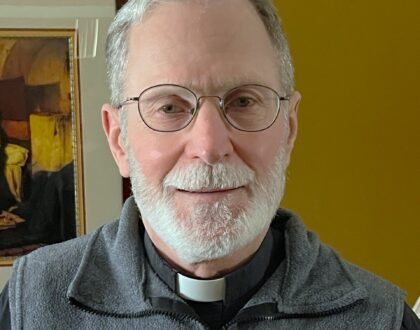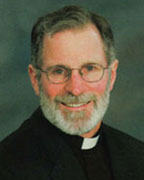Homily, October 29, 2023

From The Pastor
The greater causes of human unhappiness, separation, division, and wars are most often caused by competition for power and control. Why is that? How is it that, in the larger view of human existence, petty things can create lifelong pain and division between those who would otherwise be close friends or loving relatives?
Last week, we reflected on Jesus as the truth of God, and how Jesus had to defend himself against the competition and jealousy of the Pharisees. On the largest level, the answer is rooted in the reality of sin through the disobedience of humanity against the truth of Divine Love. Sin causes separation and division between and among peoples. This is the case in any personal family unit, social communities, cities, states, nations, and world. Sin wounds the fabric of relationships on every level distorting the truth of God and the unity and oneness that God intends. As a result, human relationships suffer on every level of society with grave consequences.
Today’s gospel is another expression of the same tension. It reflects the nature of wounded and insecure people who go to great lengths to defend and protect their perceived sense of power and control. Once again, the argument is a petty one to trip up Jesus who is seen as a threat to the established religious/social power structure. It could sound like teenage jealousy over who gets to date the cutest boy or the prettiest girl. “Teacher, which commandment in the law is the greatest?”
This is another attempt to shame and discredit Jesus in an argument that would threaten his credibility. A weak attempt at best against the One who is the truth of Divine love. Jesus avoids the pitfall on two levels. First, and most importantly, Jesus reveals the core truth and purpose of the Ten Commandments that have since been fashioned into 614 Laws. Jesus responds, “You shall love the Lord, your God, with all your heart, with all you soul, and with all your mind. This is the greatest and first commandment. The second is like it: You shall love your neighbor as yourself. The whole Law and the prophets depend on these two commandments.”
Secondly, Jesus makes it clear that all the other laws lack meaning or influence without the first and greatest commandments of loving God and loving one’s neighbor as oneself. The scholar of the Law could only agree and walk away. This was an argument he could not defend. Jesus spoke undeniable truth.
How do we learn to love our neighbor if we have not learned to love ourselves? Resisting and rejecting my neighbor is only a projection of how I may be resisting and rejecting myself. It is not a mystery or a secret that, because of sin, we are wounded human beings trying to defend ourselves against those who threaten our self-claimed power or control. The sooner we admit this very human reality, the sooner we will find peace in ourselves and improve our relationships with others.
To love our self will teach us how to love God. True or mature love of self will reveal the presence and the love of God within us. The love of self, in its truest form, is the love of God in us. This is not something we achieve by our own efforts. It is something we discover or awaken to; I can love myself because I have come to realize and accept that God loves me just a I am. If the love I have for myself is possession or performance based, that love will waver with the next best possession or the next best compliment, or not. This love is falsely created.
True love of self can only come from God who is the source and Giver of all love. Jesus is the perfect example. Jesus loved himself fully in the love of his Father. Secure in the Father’s love, Jesus could readily deflect the petty arguments against him, as well as accepting a death powerful enough to redeem the world. Free from sin, Jesus had no inner division, no inner wounds, no hidden resentment, or jealousy he needed to hide or defend. Jesus’ love for himself was true and undivided in the surety of the Father’s love. He was free to love freely.
This is the wisdom of the Jewish Shema Jesus quoted to the Pharisee/scholar. To know, accept, and trust the love of God will lead to the knowledge, acceptance, and love of self. Outside of trusting faith, the tension of sin will lead toward competition and power games with our neighbors who we should otherwise be loving. The love of God, love of self, and love of neighbor are all the same movement. Rejection, hatred, prejudice, and judgment only serve division.
God knows and understands the challenges we face, the wounds we carry, and the sin that leans against us. The love of self is a work of faith in the gift of God’s grace. Grace comes in the wisdom and the freedom of forgiveness practiced by Jesus. Forgiving yourself, God, and others is a primary movement that plants the seeds of self-love. To resist the grace and offer of forgiveness is to waste precious energy in competition against yourself and others. ‘Others’ can be the person right next to you or the enemy you perceive ‘out there’ with judgment and fear. Surrendering to the love of God will reveal a self-love free of power games with the possibility of new relationships with neighbors of every kind.
Father John Esper
Recent Sermons

Homily, March 30, 2025
March 27, 2025

Homily, March 23, 2025
March 20, 2025

Homily, March 16, 2025
March 11, 2025

